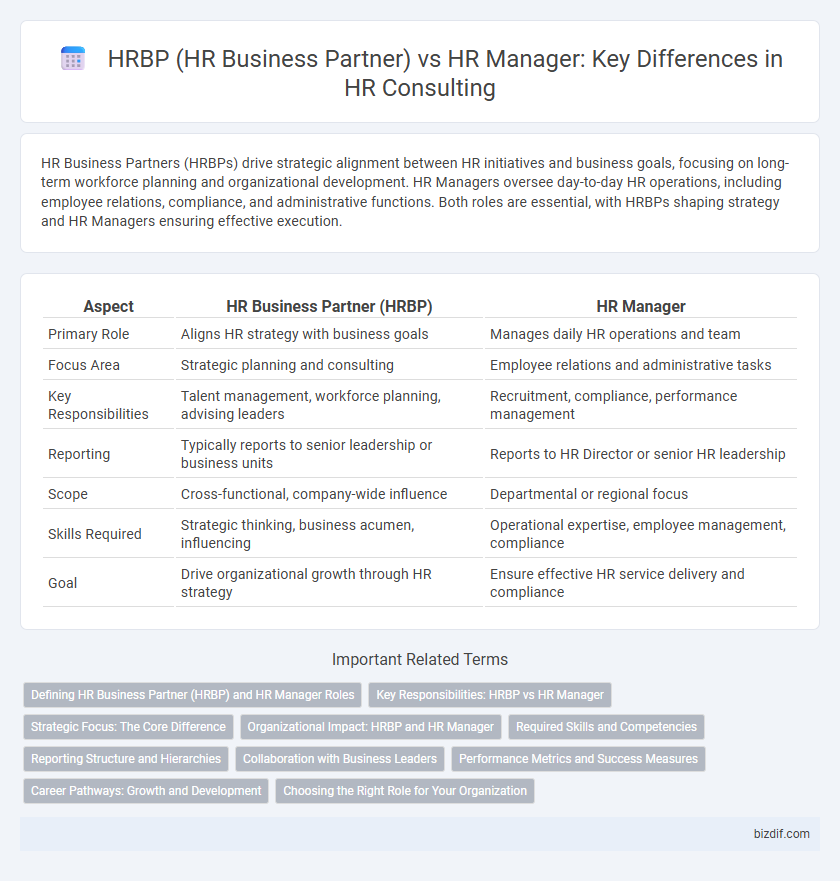HR Business Partners (HRBPs) drive strategic alignment between HR initiatives and business goals, focusing on long-term workforce planning and organizational development. HR Managers oversee day-to-day HR operations, including employee relations, compliance, and administrative functions. Both roles are essential, with HRBPs shaping strategy and HR Managers ensuring effective execution.
Table of Comparison
| Aspect | HR Business Partner (HRBP) | HR Manager |
|---|---|---|
| Primary Role | Aligns HR strategy with business goals | Manages daily HR operations and team |
| Focus Area | Strategic planning and consulting | Employee relations and administrative tasks |
| Key Responsibilities | Talent management, workforce planning, advising leaders | Recruitment, compliance, performance management |
| Reporting | Typically reports to senior leadership or business units | Reports to HR Director or senior HR leadership |
| Scope | Cross-functional, company-wide influence | Departmental or regional focus |
| Skills Required | Strategic thinking, business acumen, influencing | Operational expertise, employee management, compliance |
| Goal | Drive organizational growth through HR strategy | Ensure effective HR service delivery and compliance |
Defining HR Business Partner (HRBP) and HR Manager Roles
An HR Business Partner (HRBP) strategically aligns human resources practices with overall business objectives, acting as a consultant to leadership and driving organizational change. In contrast, an HR Manager primarily oversees administrative HR functions such as recruitment, compliance, and employee relations within departments. While the HRBP focuses on partnership and business impact, the HR Manager concentrates on operational HR management and day-to-day employee support.
Key Responsibilities: HRBP vs HR Manager
HR Business Partners (HRBPs) focus on aligning HR strategies with business goals by collaborating closely with leadership to drive organizational performance and talent development. HR Managers handle operational HR functions such as employee relations, compliance, and administrative tasks to maintain workforce stability and policy enforcement. While HRBPs operate strategically to influence business outcomes, HR Managers concentrate on day-to-day HR management and implementing HR policies.
Strategic Focus: The Core Difference
HR Business Partners (HRBPs) drive organizational success by aligning human resources strategies with business objectives, focusing on long-term workforce planning and talent development. In contrast, HR Managers emphasize operational execution, managing day-to-day HR functions like recruitment, compliance, and employee relations. This strategic focus on business partnership versus administrative management highlights the core difference between HRBPs and HR Managers in HR consulting.
Organizational Impact: HRBP and HR Manager
HR Business Partners (HRBPs) drive strategic organizational impact by aligning HR initiatives with business goals and fostering leadership collaboration. HR Managers primarily focus on operational HR functions, ensuring compliance and managing day-to-day employee relations. While HR Managers maintain workforce stability, HRBPs influence organizational effectiveness through data-driven talent management and proactive change leadership.
Required Skills and Competencies
HR Business Partners (HRBPs) require strong strategic thinking, business acumen, and change management skills to align HR initiatives with organizational goals. HR Managers need expertise in employee relations, compliance, and operational HR processes to efficiently manage day-to-day functions. Both roles demand excellent communication and problem-solving abilities, but HRBPs focus more on influencing leadership and driving business outcomes.
Reporting Structure and Hierarchies
The HRBP typically reports directly to senior leadership or the HR Director, serving as a strategic liaison between business units and the HR department. In contrast, an HR Manager usually reports to the HRBP or HR Director and focuses on operational and administrative HR functions within a specific team or department. Hierarchically, the HRBP holds a more strategic role aligned with organizational goals, while the HR Manager handles day-to-day HR management and employee relations.
Collaboration with Business Leaders
HR Business Partners (HRBPs) specialize in aligning HR strategies with business goals, working closely with business leaders to drive organizational performance and change management. HR Managers typically focus on managing HR operations and ensuring compliance, but HRBPs act as strategic consultants, providing insights that influence leadership decisions and workforce planning. Effective collaboration between HRBPs and business leaders fosters talent development, enhances employee engagement, and supports long-term business growth.
Performance Metrics and Success Measures
HR Business Partners (HRBPs) emphasize aligning performance metrics with strategic business goals, tracking indicators such as employee engagement scores, talent retention rates, and leadership development impact to drive organizational success. HR Managers focus on operational performance measures like time-to-fill vacancies, compliance with labor laws, and employee productivity levels to ensure efficient HR processes. Success for HRBPs is measured by their ability to influence business outcomes and foster a high-performance culture, whereas HR Managers are evaluated based on process efficiency and consistent policy implementation.
Career Pathways: Growth and Development
HR Business Partners focus on strategic alignment between HR initiatives and business goals, often developing cross-functional expertise and advancing towards senior leadership roles like HR Director or Chief HR Officer. HR Managers typically concentrate on operational efficiency, team management, and personnel administration, providing opportunities for growth into roles such as Talent Acquisition Lead or HR Operations Manager. Career progression for HRBPs involves strategic influence and business integration, while HR Managers build expertise in employee relations and process optimization.
Choosing the Right Role for Your Organization
Selecting the right HR role depends on your organization's strategic goals and operational needs. An HR Business Partner (HRBP) aligns HR strategies with business objectives, driving change and enhancing performance, while an HR Manager focuses on day-to-day HR functions such as employee relations, compliance, and administration. For organizations aiming to integrate HR into business planning and decision-making, an HRBP is essential; for firms requiring strong HR operational management, an HR Manager is the preferred choice.
HRBP (HR Business Partner) vs HR Manager Infographic

 bizdif.com
bizdif.com